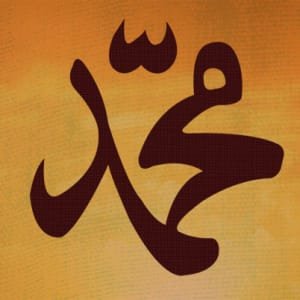
Muhammad, in full Abū al-Qāsim Muḥammad ibn ʿAbd Allāh ibn ʿAbd al-Muṭṭalib ibn Hāshim, (born c. 570, Mecca, Arabia [now in Saudi Arabia]—died June 8, 632, Medina), the founder of Islam and the proclaimer of the Qurʾān. Muhammad is traditionally said to have been born in 570 in Mecca and to have died in 632 in Medina, where he had been forced to emigrate to with his adherents in 622.
Muhammad
Home
Philosophy & Religion
Religious Personages & Scholars
Muhammad
prophet of Islam
Alternate titles: Aḥmad, Abū al-Qāsim Muḥammad ibn ʿAbd Allāh ibn ʿAbd al-Muṭṭalib ibn Hāshim
BY William Montgomery Watt | See All Contributors | View Edit History
TOP QUESTIONS
Who was Muhammad?
What family did Muhammad have?
What are the traditional events of Muhammad’s life?
What are the scholarly sources of Muhammad’s biography?
Why are images of Muhammad generally prohibited in Islam?
Muhammad, in full Abū al-Qāsim Muḥammad ibn ʿAbd Allāh ibn ʿAbd al-Muṭṭalib ibn Hāshim, (born c. 570, Mecca, Arabia [now in Saudi Arabia]—died June 8, 632, Medina), the founder of Islam and the proclaimer of the Qurʾān. Muhammad is traditionally said to have been born in 570 in Mecca and to have died in 632 in Medina, where he had been forced to emigrate to with his adherents in 622.
FAST FACTS
2-Min Summary
Medina, Saudi Arabia: Prophet's Mosque
Medina, Saudi Arabia: Prophet's Mosque
See all media
Born: 570 Mecca Saudi Arabia
Died: June 8, 632 (aged 62) Medina Saudi Arabia
Notable Family Members: spouse ʿĀʾishah spouse Khadījah daughter Fāṭimah
Subjects Of Study: Islam Qurʾān
Role In: Battle of Badr Battle of the Ditch Pact of Al-Ḥudaybiyah
TOP BOOKS ABOUT
MUHAMMAD
Muhammad: His Life Based on the Earliest Sources
Muhammad: His Life Based on the Earliest Sources
by Martin Lings
Biographical sources
Learn about the life of Mohammad, the founder of Islam
Learn about the life of Mohammad, the founder of Islam
Questions and answers about Muhammad.
Encyclopædia Britannica, Inc.
See all videos for this article
The Qurʾān yields little concrete biographical information about the Islamic Prophet: it addresses an individual “messenger of God,” whom a number of verses call Muhammad (e.g., 3:144), and speaks of a pilgrimage sanctuary that is associated with the “valley of Mecca” and the Kaʿbah (e.g., 2:124–129, 5:97, 48:24–25). Certain verses assume that Muhammad and his followers dwell at a settlement called al-madīnah (“the town”) or Yathrib (e.g., 33:13, 60) after having previously been ousted by their unbelieving foes, presumably from the Meccan sanctuary (e.g., 2:191). Other passages mention military encounters between Muhammad’s followers and the unbelievers. These are sometimes linked with place-names, such as the passing reference to a victory at a place called Badr at 3:123. However, the text provides no dates for any of the historical events it alludes to, and almost none of the Qurʾānic messenger’s contemporaries are mentioned by name (a rare exception is at 33:37). Hence, even if one accepts that the Qurʾānic corpus authentically documents the preaching of Muhammad, taken by itself it simply does not provide sufficient information for even a concise biographical sketch.
https://www.britannica.com/biography/Muhammad
It is good to learn about other religions
Downvoting a post can decrease pending rewards and make it less visible. Common reasons:
Submit